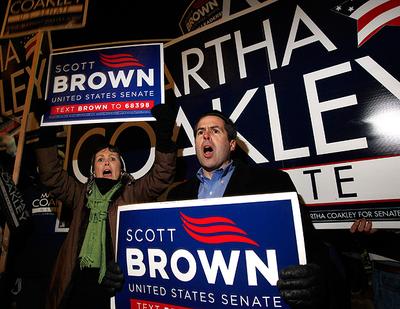Advertisement
Either Way, The New Senator Will Be An Instant Star
Resume
No matter which of the major-party candidates wins the special general election for the U.S. Senate on Tuesday, the winner will be an instant star in their party.
So says Ralph Whitehead, a political analyst and professor of journalism at the University of Massachusetts in Amherst, in an interview with WBUR's Bob Oakes.
Attorney General Martha Coakley would be the 60th Democrat, helping the party hold its filibuster-proof majority. On the other side, state Sen. Scott Brown would be the 41st Republican, a crucial vote in slowing down the Democrats.
"If Brown were to win," Whitehead said, "thus enabling the Republicans to stage successful filibusters in the Senate and to use the filibuster tactic to delay or possibly defeat the Democratic agenda in the Senate, he will be the toast of conservative Washington and conservative America. They may hold a parade for him."
For Coakley, the heightened significance of the race has increased her potential star power, Whitehead said.
"If you had asked [about Coakley's possible prominence] two or three months ago, the answer would have been no," Whitehead said. "However, because this race has now been put on the national map in such a vivid way, and because there is a greater expectation that Brown might win, I think she now could go to Washington as a person who beat back a challenge by Scott Brown and the national conservative movement, and that extends Democratic control of that seat at least for another two years."
While different polls show varying degrees of competition in the race, Whitehead contends that the national focus has, in a way, helped both candidates.
"The great windfall that has come to Scott Brown as people across the country see him as the 41st vote against the Democratic agenda, in particular, and health care reform, in general — as much as it's helping to energize the Brown campaign, it is also energizing the Coakley campaign," Whitehead said. "If Scott Brown is the 41st vote for the Republicans, that makes Martha Coakley the 60th vote for the Democrats. The national significance of this race is now, for Scott Brown, a double-edged sword."
Should Brown become the state's first Republican senator since 1979, Whitehead foresees political pressures that could derail the conservative's chances in 2012.
"A special election for a single office on what's probably a cold day in January will draw a relatively small turnout," Whitehead explained. "He will really have to strike a very delicate balance. If he were to win, he would become a national figure overnight and there would be pressure on him nationally from conservatives to be quite conservative and quite Republican to bog down the Democratic agenda."
"That's what they're going to want him to do," Whitehead continued. "If he plays that role, I think it will be harder, rather than easier, for him to win reelection in two years."
But again, Whitehead stressed, whatever the election outcome, either Coakley or Brown would have much more influence than normal in Washington.
"The great advantage that Martha Coakley has at this point is that the stronger Scott Brown appears to be, the more likely it is that Democrats who support Obama and the Democratic majority in Congress and support health care reform will pick Coakley up and put her on their shoulders and carry her across the finish line," Whitehead said. "But certainly we have to accept the conventional wisdom that if Scott Brown did win this election, it would be an event of enormous national significance and national consequence."
Click "Listen Now" above to hear the interview with Ralph Whitehead.
This program aired on January 13, 2010.
